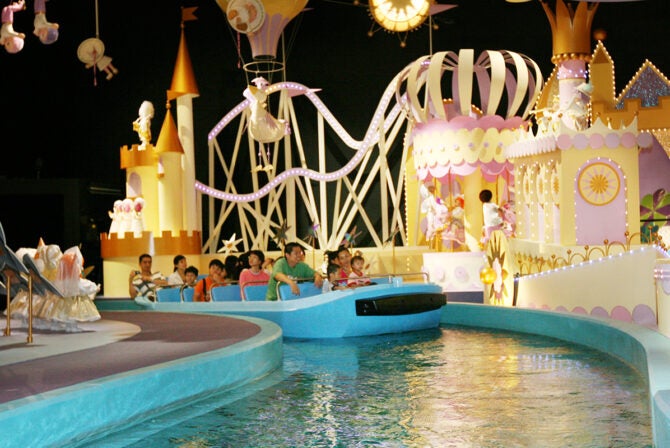My oldest son taught himself to read at age 4. This isn’t a boast. He didn’t speak until he was 3, we found out (way too late; bad Mommy) that he had hearing issues, and I figure the visual was just easier for him to grasp.
My second son, at age 4, didn’t just not read–he threw violent temper tantrums and flung books across the room at the mere mention of it. Not wanting a repeat of the bad Mommy hearing incident, I took him to get his eyes checked. And was told that his vision was 20/20, but that he might benefit from an untested therapy that wasn’t covered by insurance or guaranteed to do anything. You know, just to be safe. I passed.
And I also stopped trying to convince a 4-year-old that reading was fundamental.
He’s in second grade now, and plowing through the entire Harry Potter franchise like an 8-year-old possessed.
My youngest daughter is about to turn 5. She hasn’t taught herself to read, but neither is she hurling books. She knows her letters and has started sounding out some words (“B-A-B-Y spells Baby, Mama!”), in addition to memorizing a few (NO, STOP, GO).
She is definitely, as they say in the child-rearing trade, “expressing interest.” And I am doing everything I possibly can to discourage her.
I have my reasons.
The first one is: Before he got sucked into the crack pipe that is children’s literature, my middle son was compelled to entertain himself in other ways. He built massive cities out of cardboard boxes. He put on dance shows with his sister, featuring costume changes, spotlights, a curtain made of blankets, tickets he both designed and tore himself, and the invocation to, “Please turn off all cell phones before the performance.” He raised a Venus flytrap and fed it bugs he’d caught. He asked for pipettes as a Hanukkah gift and brewed up mystical potions in test tubes with food coloring and household spices. He designed an original card game featuring Star Wars characters.
He… did stuff.
And now he just sits around, reading about other people… doing stuff.
I know the party line: Read, Lead, Succeed! Reading introduces you to new people! Even Dr. Seuss promised: The more that you read/The more things you will know/The more that you learn/The more places you’ll go.
Reading doesn’t take you to new places. Reading takes you to the couch. And it doesn’t introduce you to new people. It introduces you to new people that someone else met (non-fiction), or to new people someone else made up (fiction).
Walking around the block takes you to a new place. Chatting with the checker at the grocery store introduces you to new people.
Now, I realize what a hypocrite I am. I was a voracious reader as a child (though I’ve also decided retroactively that I read way too many adult novels way too young, under the mistaken presumption that merely being able to understand each word meant I was capable of actually understanding the book.)
Currently, I am a writer. Mostly adult fiction, but I’ve also just produced an enhanced children’s e-book by another author.
I am, unquestionably, a pusher to others of the very stuff I’m railing against with my own kids. (Though, that’s common, right? A good dealer should never sample their product? I’m digressing…)
I’m also an addict trying to break the habit.
It wasn’t until I was in my 30s that I realized the bulk of my life experiences came from books, not from, well… life experiences. (And it’s not as if I’d lead a particularly sheltered one. I immigrated to the US from the USSR, I traveled the world during my television production days, I was married, had kids, survived health scares, I hadn’t exactly been a shut in.) But, still, the majority of the things I “knew,” and thus a majority of the opinions I held, were because other people told me theirs.
Recent cognitive research has determined that reading about an experience stimulates the same areas of the brain as if you were actually having that experience. (But, in a safe way. Who wouldn’t prefer to stare down a serial killer or live through a heart-wrenching romantic break-up or survive an epidemic from the safety of the printed page?) So your brain–and you–think you’ve lived through something.
When, in actuality, you’ve just read about someone else living through something.
(How’s my crack analogy now?)
Jews are, quite famously, The People of the Book. I wonder how much of that arose from being forbidden to do anything else (not unlike the money-lending)? Maybe Jews became voracious readers because it was the only avenue open to them. The only way to learn about new lands and new people and new ideas.
It isn’t anymore.
And while I will admit to being an enabler–our shelves are groaning with books, and my husband actually had to rent a storage space to keep the ones which simply will not fit into our NYC apartment–I am, at the same time, doing my best to remind my kids that reading about an adventure is second best to having one.
I’ve gone so far as to create walking tours of their favorite stories to demonstrate the difference between reading about something, and experiencing it for themselves.
A few years ago, many were horrified to learn that Sesame Street’s Cookie Monster was being “re-imagined,” and that instead of leaping upon a plate of treats and shoveling them into his mouth as quickly as possible, the blue, furry monster would now be educating children that “cookies are a sometimes treat.”
Consider me Cookie’s literary equivalent.








